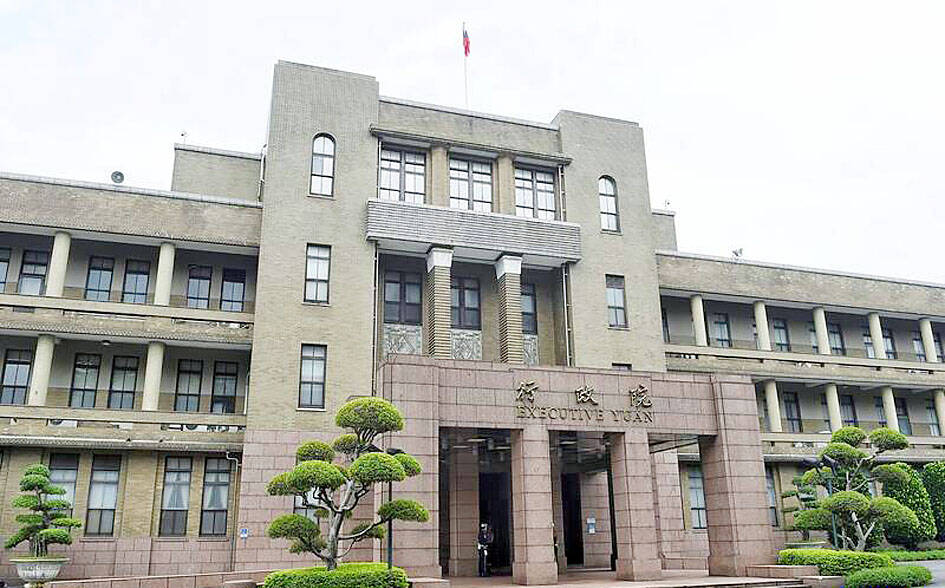The Executive Yuan yesterday approved a 4 percent pay raise for public-sector workers set to take effect from the beginning of next year.
The proposed amendment to next year’s central government budget bill, which would increase the wages of government employees, public schoolteachers and military personnel, needs to be approved by the legislature.
The last time public-sector employees received a pay raise was last year, when their salaries were increased by 4 percent.

Photo: Chung Li-hua, Taipei Times
Public-sector workers also received 3 percent pay raises in 2018, 2011, 2005 and 2001, government data show.
The Directorate-General of Personnel Administration (DGPA) estimated that next year’s pay raise would cost taxpayers NT$28 billion (US$910.87 million) and apply to about 730,000 people.
The DGPA said it recommended the salary adjustment after the consumer price index was forecast to rise by more than 5 percent this year.
The pay raise is also a response to increases in private-sector salaries and the minimum wage, as well as a recognition of the contributions made by public-sector employees during the COVID-19 pandemic, the DGPA said.
The National Federation of Teachers’ Unions in a statement praised the Cabinet for heeding recommendations to raise wages by 4 percent rather than 3 percent as in previous years.
However, it also expressed disappointment that it did not implement the federation’s suggestion of a 6 percent raise.
A legal mechanism should be established to determine wage hikes for public-sector workers and gather teachers’ input during the process, the federation added.
Additional reporting by Rachel Lin

MORE VISITORS: The Tourism Administration said that it is seeing positive prospects in its efforts to expand the tourism market in North America and Europe Taiwan has been ranked as the cheapest place in the world to travel to this year, based on a list recommended by NerdWallet. The San Francisco-based personal finance company said that Taiwan topped the list of 16 nations it chose for budget travelers because US tourists do not need visas and travelers can easily have a good meal for less than US$10. A bus ride in Taipei costs just under US$0.50, while subway rides start at US$0.60, the firm said, adding that public transportation in Taiwan is easy to navigate. The firm also called Taiwan a “food lover’s paradise,” citing inexpensive breakfast stalls

TRADE: A mandatory declaration of origin for manufactured goods bound for the US is to take effect on May 7 to block China from exploiting Taiwan’s trade channels All products manufactured in Taiwan and exported to the US must include a signed declaration of origin starting on May 7, the Bureau of Foreign Trade announced yesterday. US President Donald Trump on April 2 imposed a 32 percent tariff on imports from Taiwan, but one week later announced a 90-day pause on its implementation. However, a universal 10 percent tariff was immediately applied to most imports from around the world. On April 12, the Trump administration further exempted computers, smartphones and semiconductors from the new tariffs. In response, President William Lai’s (賴清德) administration has introduced a series of countermeasures to support affected

CROSS-STRAIT: The vast majority of Taiwanese support maintaining the ‘status quo,’ while concern is rising about Beijing’s influence operations More than eight out of 10 Taiwanese reject Beijing’s “one country, two systems” framework for cross-strait relations, according to a survey released by the Mainland Affairs Council (MAC) on Thursday. The MAC’s latest quarterly survey found that 84.4 percent of respondents opposed Beijing’s “one country, two systems” formula for handling cross-strait relations — a figure consistent with past polling. Over the past three years, opposition to the framework has remained high, ranging from a low of 83.6 percent in April 2023 to a peak of 89.6 percent in April last year. In the most recent poll, 82.5 percent also rejected China’s

PLUGGING HOLES: The amendments would bring the legislation in line with systems found in other countries such as Japan and the US, Legislator Chen Kuan-ting said Democratic Progressive Party (DPP) Legislator Chen Kuan-ting (陳冠廷) has proposed amending national security legislation amid a spate of espionage cases. Potential gaps in security vetting procedures for personnel with access to sensitive information prompted him to propose the amendments, which would introduce changes to Article 14 of the Classified National Security Information Protection Act (國家機密保護法), Chen said yesterday. The proposal, which aims to enhance interagency vetting procedures and reduce the risk of classified information leaks, would establish a comprehensive security clearance system in Taiwan, he said. The amendment would require character and loyalty checks for civil servants and intelligence personnel prior to